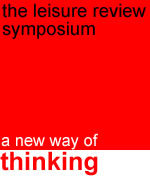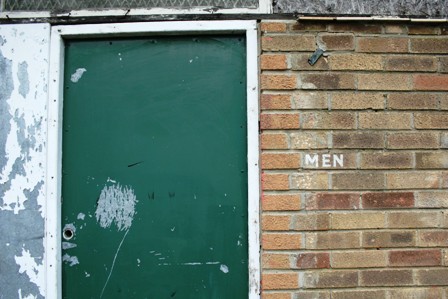
Edition number 34; dateline 27 August 2010
Come for the culture, stay long enough to pay taxes
Across the current social, cultural and political firmaments there are many things that would seem to suggest that the sport, leisure and culture sector, along with every other sector, is in crisis. Everywhere one turns there is talk of cuts. Public spending is apparently to be slashed. Quangos and non-governmental organisations, whether cost-effective and valuable or not, are to be culled. Local authority budgets are being reset in full austerity mode. Politicians and commentators talk of the dangers of a double-dip recession in an attempt to preserve the fiction that a nascent recovery has somehow shifted the line on the economic graph away from its steadily plummeting path. And the prime minister, a man of huge wealth schooled at Eton and Oxford with titled relatives and a CV that shows only one brief period of non-political employment, tells us that he is a member of a middle class that has had it easy for too long. On the people page of this issue we also note that “Liverpool FC is looking to fill the role of membership product manager with the remit to ‘retain and monetise supporters’. How low we have sunk and how deep the hole.
And yet other aspects of the daily grind offer a counterpoint to this Wagnerian melody of despondency and despair. Take as one example the work of that popular hero of metropolitan socialism, Alexander Boris de Pfeffel Johnson, current mayor of London and, like a few members of the current cabinet, sometime member of that bastion of middle-class cultural values, Oxford University’s Bullingdon Club. Elected in London on a platform that largely equated to the political consensus of a Top Gear audience, Boris has quietly recognised the value of investing public money in culturally attuned projects. The scrapping of the western extension of the congestion zone, one of Boris’s key campaign pledges (perhaps his only campaign pledge), has been quietly put on hold in order to retain the revenue it produces. This revenue has been used to shore up a budget that still embraces the London Olympics and the introduction of the London hire bike scheme. Both these were of course instigated under the watchful eye of Ken Livingstone but Boris has kept them in the figures in the face of some stiff arguments. He has also thrown himself very publicly into the job of drumming up support for both. The bike hire scheme, by way of example, may well have been Ken’s idea but it is difficult to imagine the former mayor, not an obvious cyclist, making quite such splash with the launch as Boris has; plus the current mayor has alliteration on his side, giving the phrase ‘Boris Bikes’ to the ever-changing argot of our capital city. If these policies were not sufficient to get Mayor Johnson drummed out of the Tory Party his latest scheme – a programme to fund and encourage sports projects as part of the city’s work to tackle anti-social behaviour and unemployment [See the news page in this issue] – will surely see his membership revoked.
And then there is FIFA. Any reader with more than a passing acquaintance with The Leisure Review editorial will be aware that there are few organisations held in lower esteem within TLR Towers than football’s world governing body but they may legitimately stand at present as an example of the cultural counterpoint of which we speak. At the end of August a FIFA delegation was in the country to make an initial assessment of the credentials of the Football Association’s bid for the 2018 World Cup. They arrived in London and were feted at every turn. For the purposes of our current discussion we can ignore the fact that Boris was among those fawning in their wake – we have already established that he is a crazed left-wing populist whose only concern is the cultural plight of the urban proletariat – but we should note the background noise of FIFA politics. The wings of Rumour carry suggestions that behind the mask of official disinterest FIFA is actually quite keen on coming to the UK for its quadrennial orgy of football and finance. The football is one important aspect – by dint of our national obsession with the game we have all the stadia that FIFA could possibly require and all the football obsessives to fill them – but so too is the finance. The World Cup in South Africa may have meant many things to FIFA but the massive financial return to which FIFA has become accustomed was not necessarily one of them. England’s bid has the advantage of having all the infrastructure already in place, a huge domestic market on hand and a location to which the rest of the world is more than happy to travel. To FIFA all this equates to almost perfect conditions to milk revenue from supporters and sponsors, and could make for a relatively risk-free route to financial compensation for what they will still insist on seeing as their philanthropic investment in South Africa.
While FIFA see a potential footballing gold mine, those interested in UK sport, leisure and culture might prefer to recognise a ringing endorsement of their sector. Whatever your view of its dominance, football is a huge part of our national cultural landscape. The sporting and transport infrastructure has come about through huge, long-term public investment. People from all over the world are delighted to visit the UK, as they do in their tens of millions each year, largely because of the cultural offer. As the International Olympic Committee realised, a visit to the UK means much more than just a quick trip round the tourist hot spots of Westminster. Politics within FIFA may yet mean that the Russian bid wins the day but rest assured that very strong voices are arguing that a World Cup in Britain is the financially expedient and most culturally attractive option.
Should FIFA decide that they want to come to England for their tournament we must suppose that it would be all good news for the UK’s sport, leisure and culture sector. The next logical step in the process should be the proper cost-benefit evaluation of our role as potential hosts. If FIFA want to bring the World Cup here it will cost a great deal of money to host; it has certainly cost a great deal of money to build the cultural infrastructure that has played a major in making England’s bid highly attractive. Part of FIFA’s (and indeed the IOC’s) requirement of host nations is that all revenues of the event are rendered tax-free, thus allowing the organisers to generate a huge pile of cash, whether from sponsors, merchandise or ticket sales, and slip it out of the country without dropping any on the way back to Switzerland. It is time for the UK government to set a precedent on behalf of the world’s less wealthy nations and insist that the culture of the host nation is worth paying for, or at least contributing to. The Treasury should remind FIFA (too late for 2012 and the IOC) that with power comes responsibility and that the organisers of global events should be seen to be contributing to appropriate and just taxation practices. Downing Street should also remember that with power also comes great power. Used wisely and in the interests of the common good, wielding a bloody great stick can be highly effective. Time for those global organisations to be reminded of their local responsibilities.
Jonathan Ives
Editor
letter from the editor
The Leisure Review editorial
